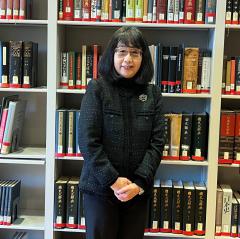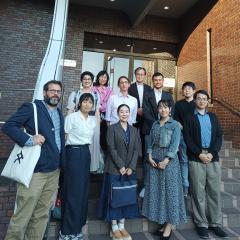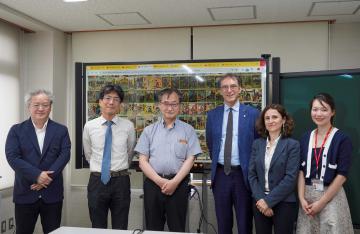-
[イベント情報]September 10, 2024(Tue)
On September 8, 2024, Prof. Changgong Meng (President, Dalian University) visited the Art Research Center (ARC).
Besides a tour of the ARC building and digital archiving facilities, Dr. Travis Seifman (ARC Research Manager/Associate Professor, Kinugasa Research Organization, Ritsumeikan University) gave an introductory presentation on the DH research activities of the Center.
[イベント情報]August 27, 2024(Tue)We are pleased to announce the launch of the new Shahon Mokuroku 写本目録/Manuscripts (Bibliographic) Database, which includes over 3,400 bibliographic records for Japanese handwritten manuscripts held by the C. V. Starr East Asian Library, University of California, Berkeley. This database is now available through the Library's Japanese Special Collections portal, provided by the Art Research Center (ARC), Ritsumeikan University.
For the convenience of users, the same bibliographic records have also been added to the Kotenseki 古典籍/Old and Rare Books database within the same portal. UC Berkeley's Japanese Manuscripts Collection comprises approximately 7,800 volumes and 4,200 single sheets, dating from the 14th to the 20th century, and was originally part of the Mitsui Bunko collection.
Japanese Special Collections at the C. V. Starr East Asian Library, University of California, Berkeley
https://www.arc.ritsumei.ac.jp/lib/vm/UCB/A0/As most of these volumes have not yet been cataloged in OCLC WorldCat, scholars interested in this collection previously needed to consult three separate title lists provided by the National Institute of Japanese Literature (NIJL): 「カリフォルニア大学バークレー校旧三井文庫写本目録稿」,「カリフォルニア大学バークレー校旧三井文庫写本目録稿追加」, and 「カリフォルニア大学バークレー校旧三井文庫御会関係資料細目稿」. Now, an additional tool is offered to facilitate the discovery of items of interest, with each record providing much more detailed information, including titles and creator names in romanization, as well as Naikaku Bunko classification terminology. To browse these titles in the Kotenseki 古典籍/Old and Rare Books database, please enter "ms" in the "object no." or "資料番号" box and click the "search" button.
The bibliographic information for these records was collected through careful examination of each manuscript by many researchers who participated in an extensive research project led by Prof. Motoi Katsumata of Meisei University, with generous funding from the Mitsubishi Foundation (2015), Meisei University (2016), KAKEN grants (2017-2021), and the International Joint Digital Archiving Center for Japanese Art and Culture (ARC-iJAC), Art Research Center, Ritsumeikan University (2023). Frequent participants in the onsite visits to the library over the years included Prof. Takahiro Sasaki of Shidō Bunko, Keiō University, and Prof. Atsushi Satō of Nihon University.
Prof. Katsumata received an honorable mention from NCC's Comprehensive Digitization and Discoverability Program Award in 2021 for his video presentation, "Connecting Books through Stamps." His project of examining seals stamped on these manuscripts has been completed, and the transcribed seal texts are now searchable in these databases (please use the "用語/other term" box for searching).
The integration of the bibliographic data for the Japanese Manuscripts Collection into the "Old and Rare Books" database has been realized through a long-standing collaboration between Prof. Motoi Katsumata (Meisei University), Toshie Marra (University of California, Berkeley), and Prof. Ryo Akama (Ritsumeikan University/Director of the ARC).
 With the establishment of the International Joint Digital Archiving Center for Japanese Art and Culture (ARC-iJAC) in 2019, the Art Research Center strives to push the internationalization of research activities that transcend disciplines and geographic boundaries.
With the establishment of the International Joint Digital Archiving Center for Japanese Art and Culture (ARC-iJAC) in 2019, the Art Research Center strives to push the internationalization of research activities that transcend disciplines and geographic boundaries.NEWS

Toshie Marra introduces the outcomes of the nearly twenty years of research cooperation in digital archiving between the ARC and the C.V. Starr East Asian Library (EAL), UC Berkeley, which boasts one the world's largest collections of Japanese cultural resources. >> Read more. 
 The colloquium comprised presentations from graduate students associated with each of the two Centers, with some presenting in English and some in Japanese.
The colloquium comprised presentations from graduate students associated with each of the two Centers, with some presenting in English and some in Japanese.
The papers explored a range of topics in Japanese Studies related to performing arts, including performing arts in geisha districts (kagai), gender identity among onnagata performers, and the representation of historical figures as heroes or villains in prewar modern theatre, as well as "new approaches to cultural studies," with one using the example of mango production in Miyazaki prefecture in a broader discussion of the establishment of tropical fruit cultivation in Japan. >> Read more. The outcomes of this research project, supported by UK Research & Innovation (UKRI) and JSPS, are currently showcased at the British Museum as part of a Special Display.
The outcomes of this research project, supported by UK Research & Innovation (UKRI) and JSPS, are currently showcased at the British Museum as part of a Special Display.
The research project, led by Prof. Ryo Akama (College of Letters, Ritsumeikan University) and Dr. Akiko Yano (Curator, Department of Asia, British Museum), aims to investigate the cultural and social impact of art and literary salons and the collective creation of art (gassaku) in early modern Japan, particularly in the Kyoto-Osaka region.
As part of this project, the 'Kamigata Bunkajin Sogo Database' (「上方文化人総合データベース」) has been established by the ARC, providing a new portal for research on early modern Japanese culture. >> Read more.
To support international joint research, we provide free accounts for ArcGIS Online, a web-based mapping software of Esri, Inc., to members of the International Joint Digital Archiving Center for Japanese Art and Culture (ARC-iJAC). >> Read more. Database News! The Shuichi Kato Collection held by the Ritsumeikan University Library is available
Shuichi Kato (1919-2008) was one of the leading international intellectuals in post-war Japan. Established in 2015, Ritsumeikan University's Research Center for Shuichi Kato and the Japanese Contemporary Thoughts aims to research the vast number of books and manuscripts in the Shuichi Kato Collection of the university library.
The ARC is pleased to announce the release of the digitally archived collection as follows:
 We were delighted to welcome Prof. Giovanni Molari (Rector, Bologna University) and Prof. Raffaella Campaner (Vice Rector for International Relations, Bologna University) to the ARC.
We were delighted to welcome Prof. Giovanni Molari (Rector, Bologna University) and Prof. Raffaella Campaner (Vice Rector for International Relations, Bologna University) to the ARC.
Dr. Travis Seifman (ARC Research Manager) gave a tour of the ARC facilities to a group of faculty and students of National Chengchi University, Taiwan.Upcoming Events
There are no upcoming events at this time.
Notice of Office Closure during Obon Summer Holiday 2024The Art Research Center will be closed from August 9 (Fri) to August 19 (Mon), 2024 due to the Obon summer holiday break.
We will not be able to respond to your inquiries or visits during this period.
We apologize for any inconvenience this may cause.
Thank you very much for your kind understanding.Office of the Art Research Center



Previous issues:
Spring 2024, Winter 2023, Autumn 2023, Summer 2023, Spring 2023, Winter 2022, Autumn 2022, Summer 2022, Spring 2022, Winter 2021, Autumn 2021, Summer 2021, Spring 2021, Winter 2020, Autumn 2020, Summer 2020, Spring 2020view this email in your browser Copyright © 2024 Art Research Center, Ritsumeikan University. All rights reserved.
Our mailing address is:
56-1 Toji-in Kitamachi, Kita-ku, Kyoto 603-8577 JAPAN
Want to change how you receive these emails?
You can update your preferences or unsubscribe from this list.[イベント情報]August 6, 2024(Tue)Background:
Toshie Marra joined the C. V. Starr East Asian Library (EAL), University of California, Berkeley in 2012 as the Librarian for the Japanese Collection. Her areas of responsibilities include developing EAL's Japanese language collections and providing instruction and reference services for Japanese studies. Previously, she worked at the Richard C. Rudolph East Asian Library at the University of California, Los Angeles (UCLA) for 22 years. She holds a Master of Library and Information Science degree from UCLA with specialization in cataloging and preservation.
Thank you very much for your time today. What sparked your interest in becoming a librarian?
Marra: Marrying a scholar of Japanese literature brought me to UCLA in the late 1980s. At that time, UCLA East Asian Library had just begun cataloging Chinese, Japanese, and Korean materials in the OCLC CJK system. I was hired as their first copy-cataloger for Japanese materials. Soon I discovered a shortage of librarians in North America with expertise in the Japanese language, especially those knowledgeable about handling Japanese pre-modern books, or kotenseki. As a result, many unique holdings remained uncatalogued in library storages. This unfortunate situation motivated me to pursue a career as Japanese Studies librarian in the U. S.
Read more>>Day 1: Thursday, August 1, 2024 13:00-17:10(tentative)
Day 2: Friday, August 2, 2024 10:00-15:00(tentative)Hybrid event (ARC, ZOOM, YouTube)
ARC members will be informed of the ZOOM URL via e-mail.
Non-ARC members can participate von YouTube via the following link.(※一部配信出来ないプログラムもございます)
For inquiries, please contact the Office of the Art Research Center: arc-jimu@arc.ritsumei.ac.jp
Organizer: International Joint Digital Archiving Center for Japanese Art and Culture (ARC-iJAC), Art Research Center, Ritsumeikan University and Program for Supporting Research Center Formation, Ritsumeikan University
Read more>>[イベント情報]July 30, 2024(Tue)The 4th online workshop was held on July 30, 2024 as part of the international joint research project Creative Collaborations: Salons and Networks in Kyoto and Osaka 1780-1880 (「上方文化サロン:人的ネットワークから解き明かす文化創造空間 1780-1880」), supported by UK Research & Innovation (UKRI) and the Japan Society for the Promotion of Science (JSPS),
The research project--a collaborative scholarly enterprise among researchers and institutions in Japan and the UK--aims to analyse the cultural and social impact of art and literary salons and the collective creation of art (gassaku) in early modern Japan, particularly in the Kyoto-Osaka region during 1780-1880.
Date: July 30 (Tues), 2024, from 18:00 JST/10:00 BST
Venue: Online via ZOOM
※This was a closed workshop.
[イベント情報]July 26, 2024(Fri)Theme:「挑戦するデジタル・ヒューマニティーズ(DH)」
Venue:Seminar Room 1, International Research Center for Japanese Studies (Nichibunken)
Date: July 26, 2024 13:00-15:30 (JST)
Organizer:Digital-HUSS コンソーシアム(高麗大・淑明女大・嶺南大・忠南大・順天大融合人材養成事業団), International Joint Digital Archiving Center for Japanese Art and Culture (ARC-iJAC), Art Research Center, Ritsumeikan University, International Research Center for Japanese Studies (Nichibunken)
Co-organizer:情報処理学会・人文科学とコンピューター研究会、高麗大学校文科大学
Event Summary:
日韓次世代デジタル・ヒューマニティーズ(DH)フォーラムは、デジタル人文学を研究する韓国と日本の 学生/次世代研究者の成果を共有し、国際的ネットワークを形成して、この分野の研究と教育とを先導できる グローバル拠点の構築を目標にしている。
今回、Digital-HUSS コンソーシアムの学生達と立命館大学の学生達が、文学・美術・社会・政治・大衆文 化などのそれぞれの問題関心にしたがって 10 個のテーマで研究成果を発表する。デジタル人文学に対する国 際的視野を培い、持続的な共同成果を創出する契機になることを期待する。
※発表言語は英語、 質疑応答は韓国語・日本語(通訳は質疑応答のみあり。日韓逐次通訳)
Related link:https://www.nichibun.ac.jp/ja/research/other_conferences_symposia/2024/07/27/
Program:
総合司会:李承垠 (高麗大学校国語国文学科副教授) / 柳澔賢(高麗大学校中語中文学科助教授)
司会・通訳:梁誠允(高麗大学校人文社会デジタル融合人材養成事業団研究教授)
13:00 開催挨拶 鄭炳浩(高麗大学校・Digital-HUSS コンソーシアム団長)
13:05 発表 1 李娟優・柳賀英・許恩智 (高麗大学校日語日文学科)
「テキストデータの分析を通じて見た韓国人のコンテンツツーリズムの消費:「スラムダン ク」事例を中心に (Consumption of Korean content tourism through text data analysis: Focusing on
Content Tourism)」 13:15 討論 13:20 発表 2 戸塚史織 (立命館大学文学研究科 行動文化情報学専攻 博士後期) 「日本における絵画のデジタルアーカイブと分析:太田記念美術館の浮世絵コレクションア ーカイブの事例を中心に(Digital Archiving and Analysis of Visual Art in Japan: A Case Study of the Ukiyo-e Collection at the Ota Memorial Museum of Art)」 13:30 討論 13:35 発表 3 朴繍顯・朴株賢 (高麗大学校中語中文学科) 「初期 K-POP アイドル IP のストーリーワールドについての DH 分析(DH Analysis on the Story World of Early K-Pop Idol IP)」 13:45 討論 13:50 発表 4 立花唯翔 (立命館大学文学研究科 行動文化情報学専攻 博士前期) 「容量を測る−SfM-MVS を利用した大甕の容量計測から見えること−Measuring capacity: what can be seen from measuring the capacity of a large jar using SfM-MVS)」 14:00 討論 14:05 発表 5 李基焄・杜ナリン・申采沅 (高麗大学校言語学科) 「自然言語処理技法を活用した大韓民国進歩·保守政党のテキスト比較分析 (Comparative Text Analysis of South Korean Progressive and Conservative Parties Using NLP Techniques)」 14:15 討論 14:20 発表 6 Pittawat TAVEEKITWORACHAI (立命館大学情報理工学研究科 情報理工学専攻 博士前期)
「AI による物語:生成 AI を使った神話ベースのビジュアルノベルの生成」(A Tale from AIs: Generating a Mythology-Based Visual Novel Using Generative AIs)」
14:30 討論
14:35 発表 7 陸智完・金星彬・柳顯宗 (高麗大学校言語学科)・朴涓秀 (高麗大学校メディア学部)
「AI が生成したテキストの文学的受容可能性と文学の本質探求 (A Study on the Literature Acceptability of AI-Generated Texts and the Essence of Literature)」
14:45 討論
14:50 発表 8 羅海濱・李泰旻・李昞潤(高麗大学校国語国文学科)・羅海濱(高麗大学校英語英文学科)
「韓国の口碑文学の様相とデータの現代的活用 (The Modern Use of Data and Patterns of Korean Oral Literature)」
15:00 討論
15:05 発表 9 平野 理紗子(立命館大学文学研究科 行動文化情報学専攻 博士後期)
「デジタルアーカイブによるデザイン事典の構築と展望(The Construction and Prospects of a Design Encyclopedia Database from Digital Archives)」
15:15 討論
15:20 発表 10 潘孝林・李俊姬 (高麗大学校西語西文学科)
「空間を超えてスペイン語を体験する:セマンティック・ウェブで見る特殊なラテンアメリカ スペイン語(Experiencing Spanish Beyond Borders: Exploring Unique Latin American Spanish on the Semantic Web)」
15:30 討論
15:35 終了
[イベント情報]July 17, 2024(Wed)The 137th International ARC Seminar will be held as a webinar on Wednesday, July 17, from 18:00 JST.
The program is as follows:
Speaker: Ryu SUGIMOTO (Director, Kuwana City Museum)
Topic: Issues and Prospects for Research on Matsudaira Sadanobu
Date: Wednesday, July 17, 18:00 - 19:30 JST
Participation: online via Zoom, free of charge (affiliated parties only, no reservation required)
*This is a closed event and YouTube livestream is not available.
[イベント情報]July 8, 2024(Mon)
The 2nd Joint Colloquium of the Art Research Center (ARC), Ritsumeikan University and the Center for Japanese Studies (CJS), University of California, Berkeley was held at the ARC on June 21, 2024.
The colloquium began with opening remarks by the Director of the ARC, Prof. Ryo Akama (College of Letters, Ritsumeikan University), followed by presentations from individual graduate students associated with each of the two Centers, some presenting in English and some in Japanese.
The first five papers explored a range of topics in Japanese Studies related to performance and performing arts, including discussions of performing arts in geisha districts (kagai), gender identity among onnagata performers, and the representation of historical figures as heroes or villains in prewar modern theatre. The final two papers expanded into "new approaches to cultural studies," with one using the example of mango production in Miyazaki prefecture in a broader discussion of the establishment of tropical fruit cultivation in Japan.
A general discussion followed the individual student presentations. Attendees noted that many of the presenters' papers focused on a similar, overlapping, historical period - namely, the decades spanning the late 19th to early 20th centuries - and suggested that, taken together, these papers on disparate topics could reveal new insights about the period.
ARC Research Manager Dr. Travis Seifman, chair of the colloquium, expressed:"Academic cultures can differ greatly from one place to another; while many scholars focus on uncovering empirical details, others are more theoretical and interpretive in their approaches. International colloquia like this one provide invaluable opportunities to encounter and engage with one another's differing approaches to scholarship, and for each of us to be inspired towards new ideas or approaches for our own research. I am excited that we have begun this regular series of joint colloquia, and believe their impact will only grow as the mutual engagement continues."
The colloquium concluded with closing remarks from Prof. Jonathan Zwicker (Center for Japanese Studies, Dept. of East Asian Languages and Cultures, University of California, Berkeley).
Afterward, a reception was held, providing colloquium participants with further opportunities for networking and exchanging opinions and ideas about their research.
Organizer: Art Research Center (ARC), Ritsumeikan University; Center for Japanese Studies (CJS), University of California, Berkeley
Supported by: International Joint Digital Archiving Center for Japanese Art and Culture (ARC-iJAC), Art Research Center, Ritsumeikan University
Read more>>[イベント情報]July 3, 2024(Wed)On July 3, 2024, Prof. Giovanni Molari (Rector, Bologna University) and Raffaella Campaner (Vice Rector for International Relations, Bologna University) visited the Art Research Center (ARC).
Besides a tour of the ARC building and facilities, discussions and an exchange of opinions on collaboration in digital humanities research and education took place with Prof. Ryo Akama (College of Letters/Director of the ARC).















